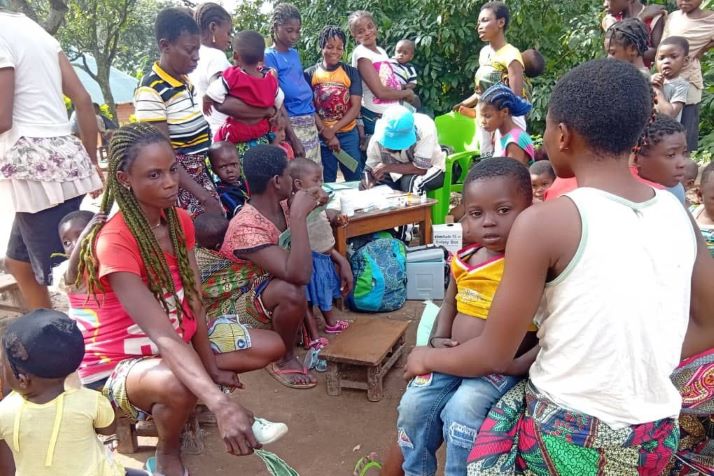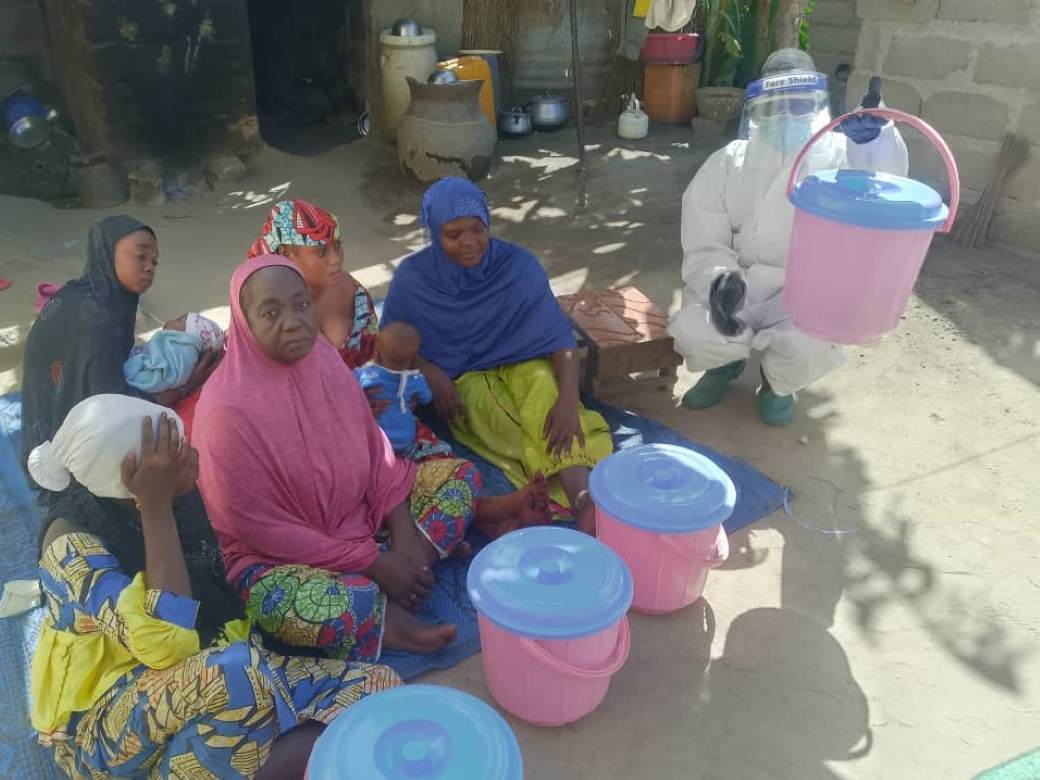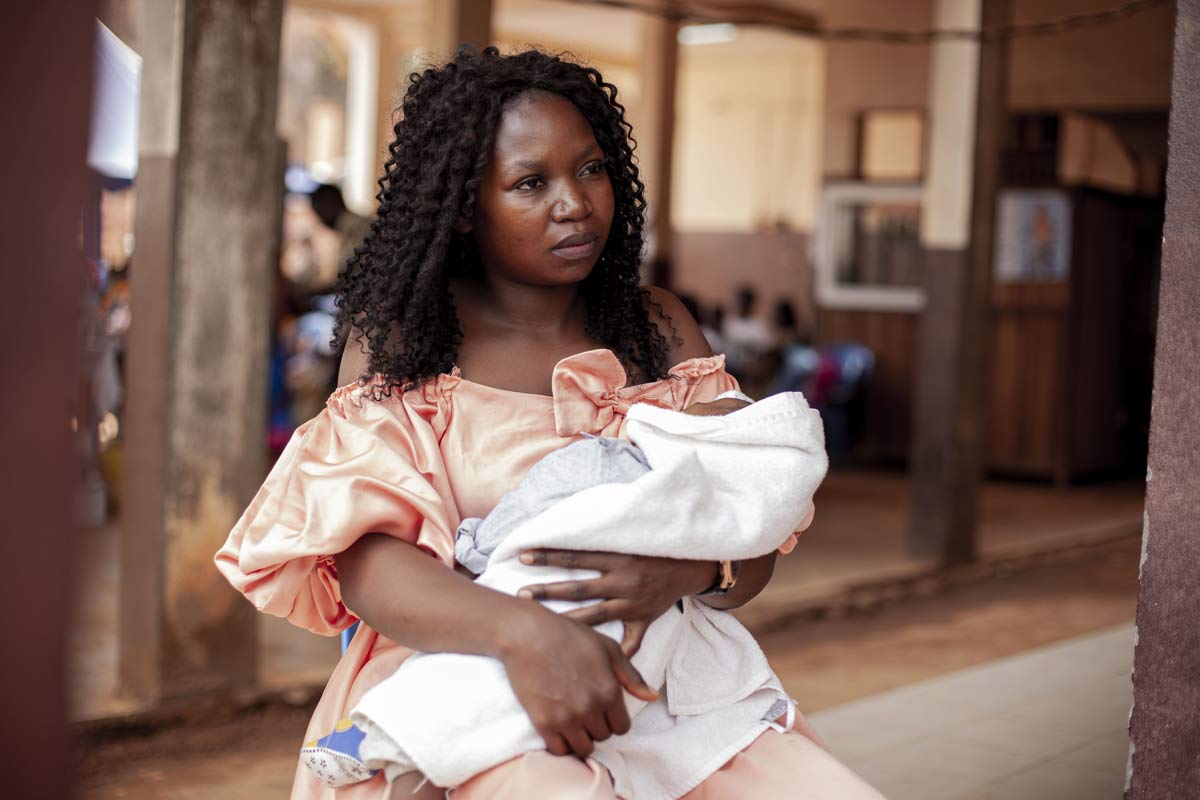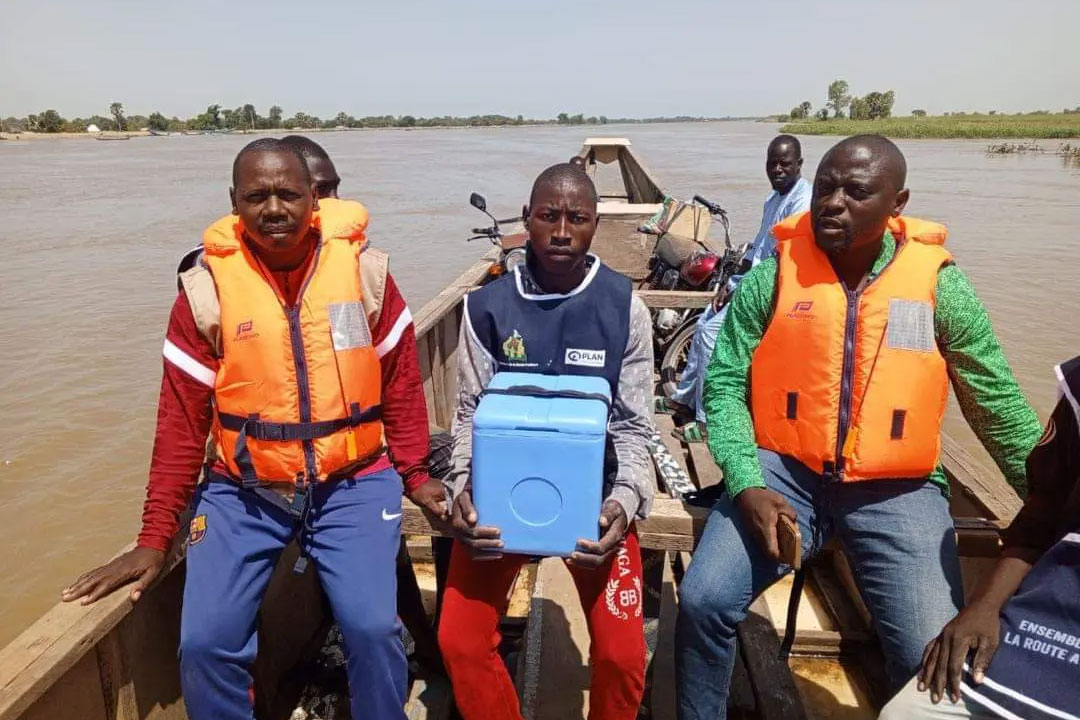A turning point: Cameroon rolls out world’s first malaria vaccine
Today, Cameroon makes history by launching the world’s first malaria vaccine as part of its immunisation programme – a major step in the battle against a disease that claims nearly 14,000 Cameroonian lives each year.
- 22 January 2024
- 8 min read
- by Nalova Akua
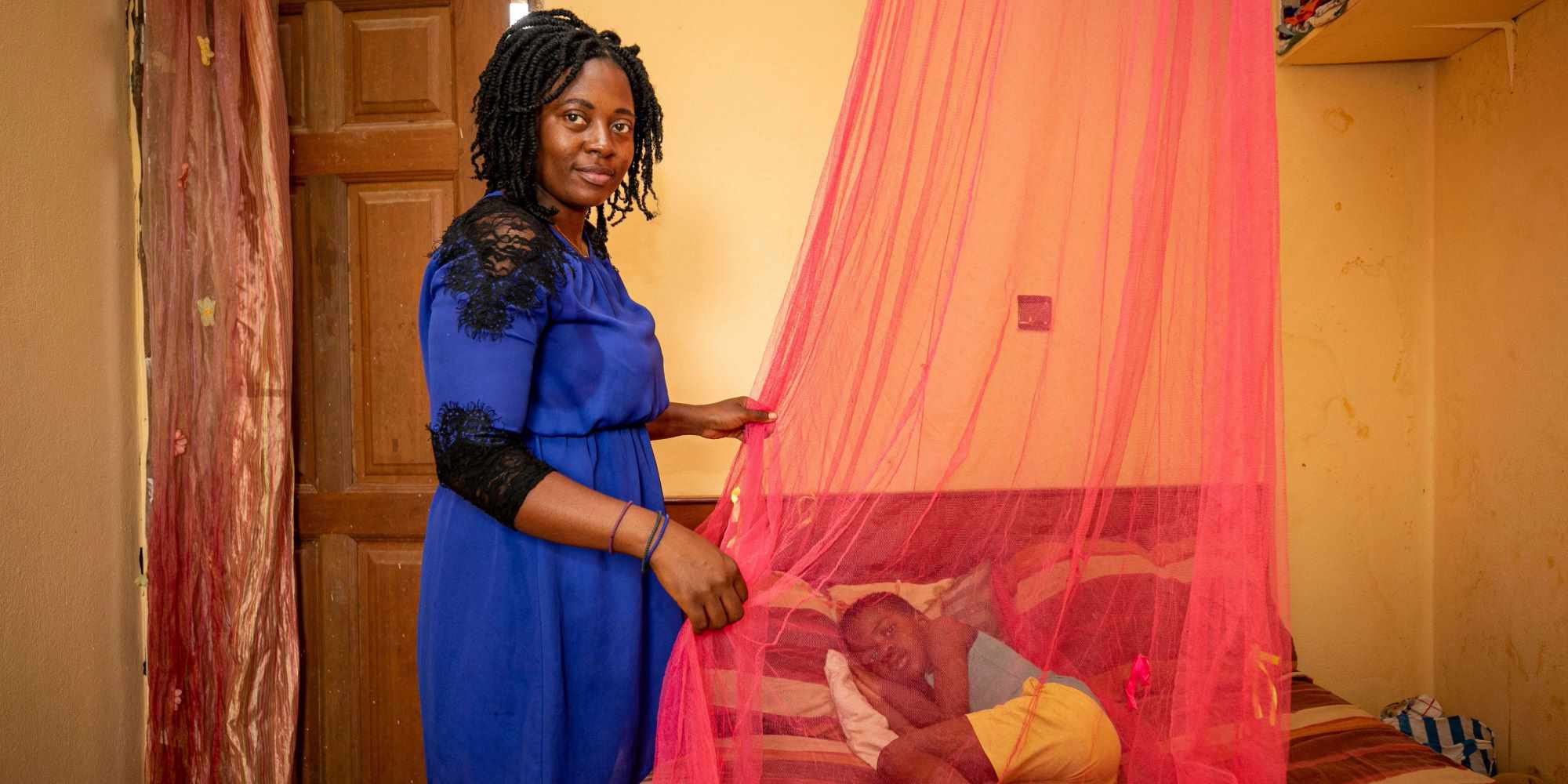
October proved to be a challenging month for the Zamgue family, who live in Yaoundé, Cameroon's capital city. All seven of them – two parents and five children – fell sick with malaria. For the family, that meant more than familiar fevers, aches and anxiety about worsening symptoms. The tussle with the often-deadly parasitic infection also landed as a financial knock.
Flore Zamgue, the 35-year-old homemaker and mother of five, reflected on the ordeal: "Some took injections, others were given infusions. My 15-month-old baby had to take syrup. Each infusion cost 5,000 [Central African] francs [US$ 8.22], and each person needed three. I incurred substantial expenses for the hospital-based treatments."
"I believe introducing the vaccine in Cameroon is a commendable step, as it will help combat the scourge of malaria. Given that it’s provided free of charge, this is indeed a positive development for everyone, especially mothers."
- Flore Zamgue, mother of five, Yaoundé
The following month, when news broke that Cameroon had taken delivery of 331,200 doses of RTS,S, the first antimalarial vaccine to be recommended by the World Health Organization (WHO), the family welcomed the news with cheers. "I believe introducing the vaccine in Cameroon is a commendable step, as it will help combat the scourge of malaria," said the young mother, whose family is still recovering from the disease, which they fell prey to despite their habitual use of treated mosquito nets. "Given that it's provided free of charge, this is indeed a positive development for everyone, especially mothers."
Nearly 14,000 malaria deaths a year
Malaria takes a devastating toll in Cameroon, claiming an estimated 13,839 lives in 2021 alone, according to World Health Organization figures.
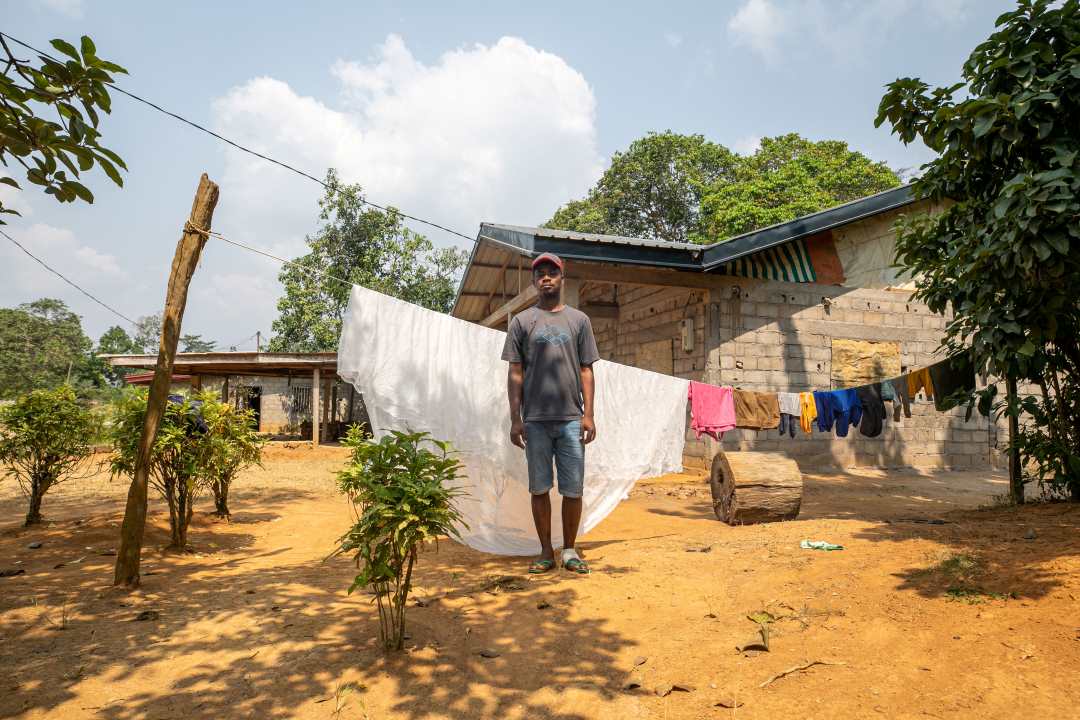
Crédit : Gavi/2024/Go'tham Industry
This disease remains the primary cause of consultations and hospitalisations in Cameroon, one of the 11 countries carrying 70% of the global malaria burden. Its impact is particularly felt among children aged under five and pregnant women. The National Malaria Control Program (NMCP) reports a hospital incidence of 113 cases per 1,000 inhabitants. WHO estimates the annual case load at 6.7 million, with nearly 30% of outpatient visits being malaria-related.
Dr Shalom Tchokfe Ndoula, Permanent Secretary for Cameroon’s EPI, asserts that achieving optimal coverage could potentially slash annual deaths by more than a third, and result in a significant decrease – more than 60% – in hospitalisations for severe malaria cases in covered areas.
Dr Bouetou Tantoh Theresia, Chief Medical Officer at Etoug-Ebe Baptist Hospital in Yaoundé, highlights the substantial impact of malaria on her institution, where 12,000 patients are received monthly – at least one third of them grappling with the parasitic infection. "During peak infections, we face space constraints and experience shortages of medications for treating severe cases. However, we strive to do our best," she says.
Dr Bouetou places her hopes in the introduction of the RTS,S vaccine, which targets Plasmodium falciparum, the particular parasite responsible for the most dangerous type of malaria. She believes this intervention will alleviate the strain on Cameroonian hospital services, saying, "Preventing malaria from a young age is particularly beneficial, potentially significantly reducing the number of severe cases, especially among children."
42 districts will roll out vaccines in initial wave
The inaugural rollout of the RTS,S vaccine is set to cover 42 health districts across Cameroon's ten regions, constituting roughly 20% of the country's total health districts. The targeted demographic for this phase encompasses an estimated 249,133 children aged 0–24 months. Particularly in the Northern and Far North Regions, where malaria transmission is seasonal, a vaccination strategy tailored to this seasonality is being undertaken.
The vaccine is administered in four doses, the first at six months, followed by two more, each at a one-month interval from the last, with the fourth dose administered over a year later. Each dose is delivered as an injection to the thigh, a method aligned with other long-established jabs that are part of Cameroon's immunisation programme, which has been a stalwart presence in the country's health system for almost 50 years.
Extensive trials have shown the vaccine to be safe and effective, offering about 36% protective efficacy following all four doses. Though that figure is comparatively lower than for many familiar vaccines targeting viral and bacterial infections, the RTS,S vaccine represents a groundbreaking stride in the battle against the world's most lethal parasite, and a game-changing addition to the world's arsenal of malaria management tools.
Have you read?
The introduction of the RTS,S vaccine supplements the 14 antigens already in Cameroon's vaccination programme. Dr Shalom Tchokfe Ndoula, the Permanent Secretary of the Expanded Programme on Immunization (EPI) in Cameroon, underscores, "This isn't about orchestrating a distinct campaign; rather, it involves integrating the antimalarial vaccine into routine vaccinations and adhering to the standard schedule. This schedule considers the specificities of the malaria vaccine, with the initial dose administered starting from the sixth month."

Crédit : PEV Cameroun
Dr Ndoula asserts that achieving optimal coverage could potentially slash annual deaths by more than a third, and result in a significant decrease – more than 60% – in hospitalisations for severe malaria cases in covered areas. He places importance on updating the knowledge of health care professionals, engaging with the community to address concerns and communicating the advantages of the new vaccine in malaria prevention.
Overcoming disinformation
As Cameroon prepares to initiate the administration of the RTS,S vaccine in the first 42 designated districts, a significant number of Cameroonians have expressed scepticism towards the vaccine, articulating doubts about its safety and effectiveness. In response to these concerns, the Cameroonian Minister of Public Health, Dr Manaouda Malachie, affirmed in a November 2023 statement that the introduction process of this WHO-approved vaccine adhered to "all essential required steps", including approval from the National Technical Advisory Group on Immunisation in May 2022 and the inter-agency coordination committee in June 2022.
"Educational sessions are taking place in health care facilities, and community dialogues are organised in all health zones. Partner associations, with whom we regularly collaborate, are also gearing up to intensify their actions in villages and neighbourhoods to strengthen community awareness."
- Dr Adalbert Tchetchia, head of the Social Mobilisation Unit, Ministry of Health
Professor Tih Pius Muffih, Director of Cameroon Baptist Convention Health Services, who has collaborated with numerous health care facilities and providers in Cameroon, strongly recommends that parents embrace the vaccine without fear, emphasising the results of clinical trials conducted in Malawi, Kenya, and Ghana, which demonstrate the vaccine's safety and efficacy.
"I expect that once the vaccine is introduced in Cameroon, it will significantly reduce malaria cases in children and, of course, decrease infant mortality rates," said Professor Muffih, adding that he hopes the introduction of the vaccine will not only "mitigate the impact of malaria" in the country, but also reduce expenses related to preventing or treating this disease.
However, faced with widespread rumours, particularly on social media, there is an urgent need to take more action on the ground to counter misinformation and strengthen communication efforts at the local level. This is where community mobilisation, involving local leaders, health care professionals and other key stakeholders, becomes crucial: it could play a pivotal role in raising awareness and educating the population. A grassroots approach could help overcome cultural and linguistic barriers, addressing specific concerns of each community, and fostering a climate of trust conducive to vaccine acceptance.
Dr Adalbert Tchetchia, a health sociologist and head of the Social Mobilisation Unit at the Ministry of Health, is vigilant. He explains, "frontline health care professionals and community actors are currently undergoing training to conduct awareness campaigns door-to-door. Simultaneously, educational sessions are taking place in health care facilities, and community dialogues are organised in all health zones. Partner associations, with whom we regularly collaborate, are also gearing up to intensify their actions in villages and neighbourhoods to strengthen community awareness." Additionally, the teams at the 1510 call centre are on standby to address parents' questions.
Dr Tchetchia highlights that recurring concerns of the population include the fear of abandoning other malaria prevention methods, suspicion of being subjects in an experiment and doubts about the quality and efficacy of the vaccine. According to him, a main goal of the awareness campaign is to reassure the population by emphasising that vaccination complements other prevention methods without replacing them.
"Regarding the safety, quality and efficacy of the vaccine, clinical studies and the four years of the pilot phase show that it can be confidently used for human health.”
- Dr Adalbert Tchetchia, Ministry of Health
He notes that the vaccine;s development dates back more than 30 years and that a pilot programme ran successfully between 2019 and 2022 in Ghana, Kenya and Malawi.
"The decision to introduce the vaccine in Cameroon, as in many other African countries, is based on these assurances, including the WHO and public authorities' approval. Regarding the safety, quality and efficacy of the vaccine, clinical studies and the four years of the pilot phase show that it can be confidently used for human health," he adds.
The results of assessments during the pilot phase of introducing the RTS,S antimalarial vaccine are promising. They reveal a 13% reduction in all-cause mortality among eligible vaccinated children. Moreover, the vaccine has led to a 22% reduction in hospitalisations for severe forms of malaria in these children, resulting not only in a significant reduction in suffering for families but also substantial savings for the health care system.
This article was translated from the original French. To view the original click here
